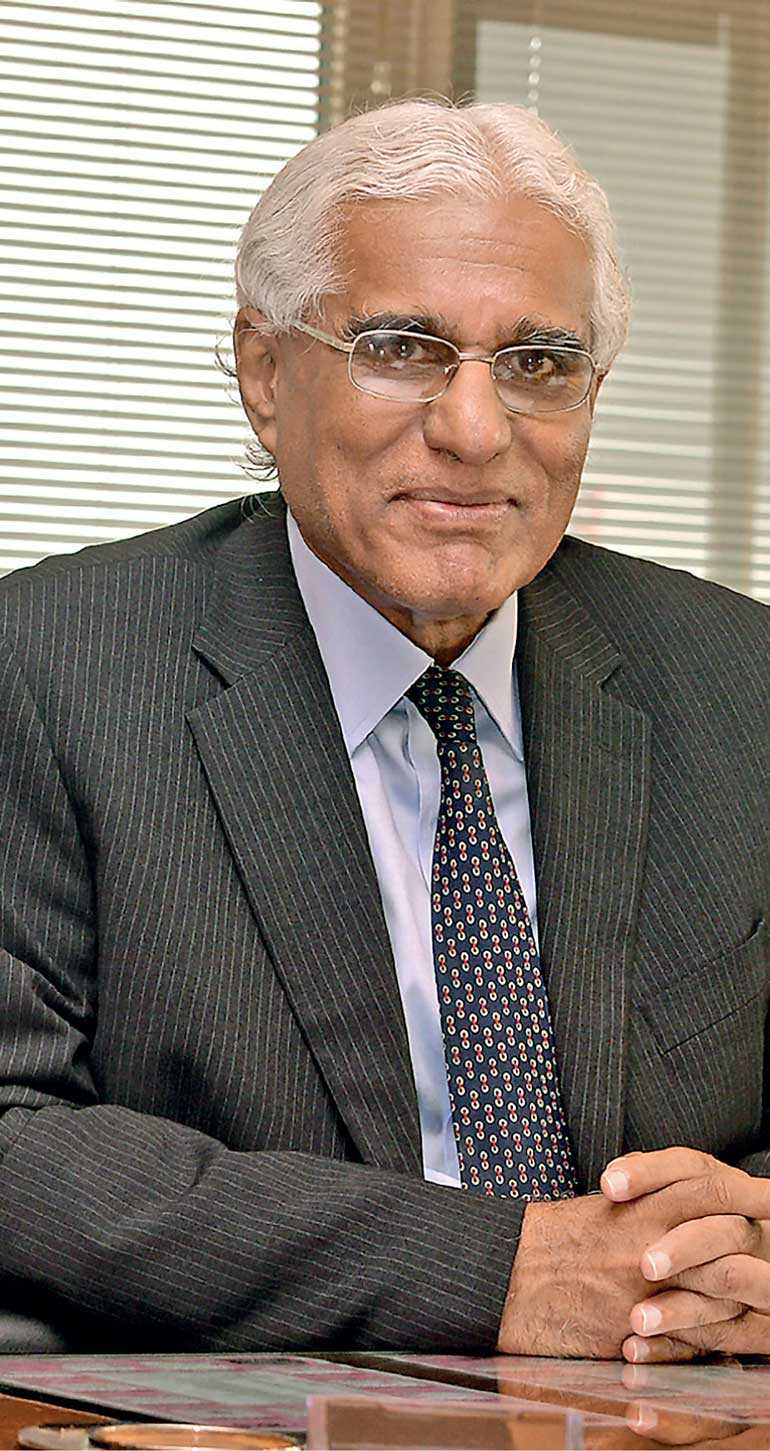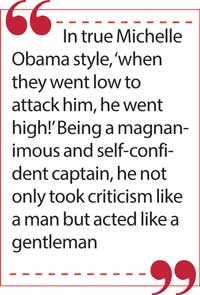Thursday Feb 19, 2026
Thursday Feb 19, 2026
Friday, 27 December 2019 00:00 - - {{hitsCtrl.values.hits}}

A Google search, or even the Guinness Book, will not yield anyone who has the twin attributes of having captained both his country at Rugby and the Banking Industry as a Central Bank Governor, Fed Chairman or Chancellor of the Exchequer.
Except our own Indrajit Coomaraswamy.
With a true Shakespearean flavour he was gentle, purposeful and classy, and the elements of ‘sportsmanship’ mixed so well in him that the accolades we have read in the media on his self-imposed retirement, says to all the world: ‘this was a man’.
And he was indeed a sportsman. The connotation of sports is different from sportsmanship; to wit, countless politicians and industry leaders have sports as their attributes in their record books. They are in our Parliament too. Yet how many could claim to be sportsmen in the larger sense of behaving sportingly?
45 years ago, as a rugby reporter and columnist, the sports editor of the erstwhile Times of Ceylon Elmo Rodrigopulle asked me to keep an eye on ‘this man’ – Indrajit – as he had a winning and stylish streak in him.
In doing so I found that the path from the local and international playing fields of cricket or rugby, to the higher echelons of the banking industry or the multilaterals is well-trod, but rarely with greater distinction than by Indrajit Coomaraswamy.
Sports builds character and class and if applied in the right spirit makes one a god given gift to society.
Humility is foremost. For instance, as the guest speaker at a Transformation seminar by Milinda Moragoda’s Pathfinder Foundation in November, Indrajit in came in a bit late. He prefaced his opening comments with an apology: he was held up attending a Central Bank training program on Leadership conducted by an expert. He then shares his learning by stating I drew one chastening conclusion for myself; that I am not a very good leader, in fact rather a poor leader! He meant it seriously.
And then he spoke on the subject of change and transformation in the Central Bank. More on this later, but first to rugby and its links to his personality.
Rugby and its connection to his personality
To play rugby and captain a team is one thing but to apply its attributes to one’s career is another. My first coverage of him was in my hometown Kandy. The CR&FC captained by Mohan Sahayam was playing Kandy Sports led by Denzil Kobbekaduwe. Indrajit played in the game.
CR&FC won due to the brilliant loose play especially by wing forwards Indrajit and ‘Doc’ Tony de Sylva who not only pounced on the loose ball but marked Denzil and centre Jayantissa Ratwatte giving them no room to work their three-quarter line. He made not one, but a few sizzling runs which caught the Kandy side off-guard.
CR went on to win the Clifford Cup thanks to vibrant play of the duo and of course the brilliance of Sahayam Specials. They went on to play in the Ceylon Side. And Indrajit deservedly graduated to captain the Sri Lanka team in the 1974 Asiad where we emerged runners-up; the highest achievement we have had to date.
Wing forwards had a very pivotal role to play under the old rules. They were both required in attack as well as in defence. In these roles Indrajit played like a veteran. If you wanted to see a good wing forward, one with flash and beauty, and substance and urgency, then the duo of Indrajit and ‘Doc’ Sylva were there for us to see.
Part of Indrajit’s genius is that he knew when to take risks. When the Bond Scam hit the Central Bank and the country it shook the political firmament. Who would want to risk one’s record to take on a thankless job? But that came naturally to the ruggerite after some reflection.
He made the choice to serve the country at a time of dire need. He seemed to say: what’s the big deal? I am clean. I can give and take a tackle. You want me to lead, sure I will. But the field has to be open and fair and I should have the liberty to do what I need to do. The then President agreed.
Two years later as I lunched with him and Milinda Moragoda, Indrajit mentioned that challenging as the times were, he was optimistic. He had very good people at the Central Bank. But he had set for himself a time limit of (say) three years. He will use that time to build and prepare a team for the future. He was determined to put the stigma of the Bond scam into the dustbin of history so that the path can be cleared for the good people of the bank to get on with their professional work.
Yet as he moved in, like a true captain with substance, a sense of urgency and to defend his team where they were right, and put right what was wrong, there were some brickbats thrown at him for defending his team and the practices at the bank. In true Michelle Obama style, ‘when they went low to attack him, he went high!’ Being a magnanimous and self-confident captain, he not only took criticism like a man but acted like a gentleman.
Scrums, mauls and lineouts were his domain. He could take them in his stride. He had a keen sense as to where the ball will be in the scrum. He got there before others were destructive. He had good timing too. He would move right up to the line of attack to face the opponents but was careful not to overstep, lest he his blown offside! Calculation was critical for him.
He was intent on transforming the team in the field. But the Governance Structure in the ‘Big Clubhouse’, as it were, must change too! Hence, he was passionate that the new Central Bank Bill must be passed by Parliament. That the Monetary Policy Board should have an arm’s length relationship with the Governing Board; that the technical team (the players in the field) should be able to play their fair game without interference from the ‘Clubhouse bosses’.
He also was an advocate of a tight architecture. He had the direction of the goal posts in mind. He did not want random play where the ball went loose, that every Tom, Dick and Harry could walk into the Operations room. And where everybody was scampering as money was printed and asset bubbles waded into the field and goodies were distributed to the fans in the stadia and beyond. Everything got inflated!
So, he wanted a clear framework within which to play. ‘Flexible inflation targeting’ to arrest the volatility on the field; no printing of money. ‘Active Liability Management’; that we had the ability to raise funds in the markets to keep the team and the fans alive; that we could yet actively borrow funds in the market and reserve funds into ring-fenced areas for judicious use later.
As an agile ruggerite, he preferred a ‘flexible exchange rate’ than a ‘crawling peg’. Good wing forwards manage volatility in the field not only through needed cover or corner flag defence, but with frontal attacks as well judiciously managed.
His was intent to set the stage to manage exogenous shocks. Expensive defence tactics of the exchange rate, however, can hurt: “don’t defend the rate unnecessarily as it can be pretty expensive and the outcome could still be what we are trying to avoid” (some $ 4.5 billion was applied in defence of the rate and yet inflation remained at a high).
While the local teams played their best looking inwards, as captain and coach he advocated Open Play. Move the ball with fluency down the line and the scoring will come. Be outward looking. Attract outsiders to what we can offer.
We are blessed with factors of land, labour and produce and garments, precious stones and tourism, and skills and a service orientation. We can attract them all to our matches! He recognises that we have a fabulous location, a geopolitical dynamic and an aspirational fan base or population. We need to monetise these god given gifts so we carry the fan base in the stands to job growth and prosperity.
So that they are able to watch the game and participate in the match we must ensure not having to borrow to pay for our tickets which have become pretty expensive! They eat into our food budgets.
Export orientation (even our sports) is the Top Line to Indrajit. It has to be enhanced.
If not, we will not get out of the stadium. Rather, get caught instead to the debt-trap! To this end we cannot resort only to defensive play by protective imports substitution, but rather have ‘open play’ given that the share of traded goods have gone down (from some 60% to 40%).
Don’t have an ‘Anti Export bias’ is his rescue clarion call. Build strong relationships with all. Like good ruggerites, we need to build good alliances with those who can improve ‘our game’. Rugby although a rough game has its charm when played in flowing, open style. Scissor moves and dummies will in turn add zip and zest to our game.
For this we need strategic and tactical alliances. China and India are our big brothers. We need them as we do the US (60% of our Bond investors come from the US). And the rating agencies take all these relationships and activities in grading us for the market. If these relationships go sour our ability to raise funds diminishes. If the players start jabbering and not focusing on the way to attract support, and talk out of turn, we will be undermining our efforts.
Indrajit, the pragmatist, strongly feels we need them all for the short and long haul. And they need us too given our endowments. And we need them badly to help us ride out the coming storms.
But in all this we need to ‘box cleaver”. In this age of international diplomacy, Indrajit reminds us of Jane Austen’s Penelope, as a parting thought.
Penelope had many men who were interested in her. They courted her, but she made sure that none of them got into her bedroom. Nonaligned as we are, we should not get too close. And, to use a rugby analogy, as a wing forward, we should get close enough to the front of the scrum but make sure we stop just short of being blown offside.
The writer could be reached via email at [email protected]